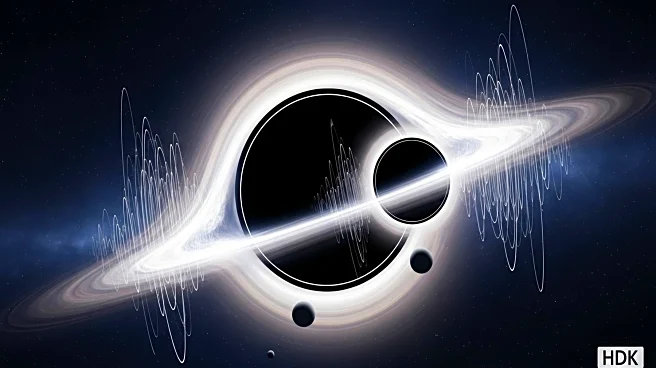What is the story about?
What's Happening?
The Laser Interferometer Gravitational-Wave Observatory (LIGO) has made significant strides in the field of astrophysics since its first detection of gravitational waves on September 14, 2015. This groundbreaking discovery confirmed Albert Einstein's theory of general relativity, which predicted that massive objects like black holes could create ripples in space-time. LIGO, along with its partners Virgo in Italy and KAGRA in Japan, has since detected over 300 gravitational wave signals. These observations have provided insights into cosmic events such as black hole mergers and neutron star collisions, opening a new window into the universe. Notable achievements include the detection of the heaviest black hole merger and the first observation of a neutron star merger, which has implications for understanding the formation of heavy elements like gold.
Why It's Important?
LIGO's discoveries have profound implications for astrophysics and our understanding of the universe. By confirming the existence of gravitational waves, LIGO has validated a key aspect of Einstein's theory of general relativity and provided a new method for observing cosmic phenomena. This has allowed scientists to study the universe in ways that were previously impossible, offering insights into the life cycles of stars and the formation of black holes. The ability to detect gravitational waves also enhances our understanding of the universe's most violent events, such as black hole and neutron star mergers, which are crucial for understanding the formation of elements and the evolution of galaxies.
What's Next?
The continued operation and enhancement of LIGO, Virgo, and KAGRA promise further discoveries in gravitational wave astronomy. Future observations may provide more detailed insights into the nature of black holes and neutron stars, potentially leading to new physics beyond Einstein's theories. The collaboration between these observatories is expected to refine the detection of gravitational waves, allowing for more precise measurements and the possibility of discovering new types of cosmic events. As technology advances, the field of multimessenger astronomy, which combines gravitational wave data with electromagnetic observations, will likely expand, offering a more comprehensive understanding of the universe.
Beyond the Headlines
The detection of gravitational waves has ethical and philosophical implications, challenging our understanding of the universe and our place within it. It raises questions about the nature of reality and the limits of human knowledge. The collaboration between international observatories also highlights the importance of global scientific cooperation in addressing complex questions about the universe. As gravitational wave astronomy continues to evolve, it may influence educational curricula and inspire future generations of scientists to explore the cosmos.














